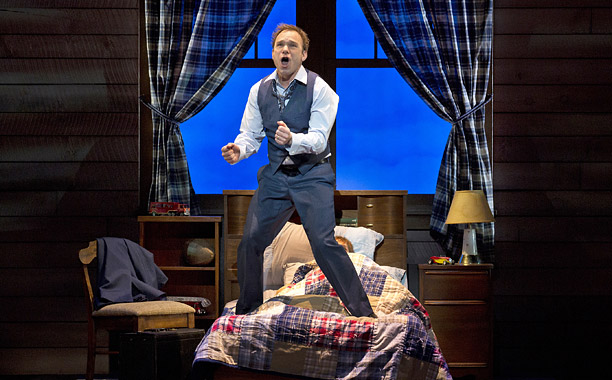The King’s Man, my latest operatic collaboration with Paul Moravec, opens tonight in Louisville. The final dress rehearsal went well, and though I’ve now done this often enough not to get cocky, we’re not expecting any horrendous problems. Paul and I are both pleased with the piece itself, and we’re delighted with Kentucky Opera‘s production. That’s all a librettist can hope for.
In honor of the great day, I offer you my official fingers-crossed video, which I’ve posted on the mornings of the opening nights of all of my previous works for the stage. May it serve us equally well this time around:
Archives for October 11, 2013
TT: Big barrel, rubber fish
In today’s Wall Street Journal drama column I have absolutely nothing good to say about Big Fish. Here’s an excerpt.
* * *
Movies used to get made out of musicals. Now it’s the other way round: “Big Fish” is based on Tim Burton’s 2003 film version of Daniel Wallace’s novel about an amiable blowhard whose final illness and death bring his son face to face with the meaning of life. “Big Fish” was one of those nominally serious Hollywood movies in which watered-down Christian symbolism is enlisted in the service of New Age spiritualism, a footless pseudo-religion that demands nothing of its adherents save the inchoate desire to be happier. On Broadway, the content-free feel-goodism of Mr. Burton’s film becomes a devout belief in the transfiguring power of the production number….
 The conceit of “Big Fish” is that Edward Bloom (Norbert Leo Butz) is a compulsive fabulist who specializes in taller-than-tall stories in which he is invariably the hero: “Be the hero of your story if you can/Be the champion in the fight/Not just the man.” Among those present are a giant, a mermaid, and Will (Bobby Steggert), Edward’s sober-sided son, who has always been embarrassed by his father’s fantasies and now longs to know if there was any truth to them at all.
The conceit of “Big Fish” is that Edward Bloom (Norbert Leo Butz) is a compulsive fabulist who specializes in taller-than-tall stories in which he is invariably the hero: “Be the hero of your story if you can/Be the champion in the fight/Not just the man.” Among those present are a giant, a mermaid, and Will (Bobby Steggert), Edward’s sober-sided son, who has always been embarrassed by his father’s fantasies and now longs to know if there was any truth to them at all.
You can, I suspect, guess the rest, just as you’ve probably already figured out that “Big Fish” adds up to little more than a long string of loosely strung musical numbers in which Edward’s extravagant tales of derring-didn’t are dramatized. Though there’s a plot of sorts, you may find it hard to understand why you should care about it, especially since the climactic epiphany is as sappy as it’s predictable.
John August, whose book is based on his screenplay for Mr. Burton’s film, has contrived to trivialize something that was more than trivial enough to begin with. He had plenty of help, though, from Andrew Lippa, lately of “The Addams Family,” whose songs blend theme-park pop with greeting-card lyrics to babyishly banal effect….
* * *
Read the whole thing here.
TT: The gadget that turned movies into art
In today’s Wall Street Journal “Sightings” column I make a consipicuously counterintuitive proposal about the history of film. Here’s an excerpt.
* * *
Is film a fine art? I don’t know many people who’d claim otherwise, even after watching this summer’s parade of brain-deadening blockbusters. Any medium that has been used to create such permanent masterpieces as, say, “Chinatown,” “Rashomon” or “The Rules of the Game” no longer has anything to prove. But was film a fine art in 1913? And how about 1933, or 1963? While most moviegoers would likely answer in the affirmative, I beg to differ. As far as I’m concerned, it wasn’t until 1983–just 30 years ago–that movies became more than a species of purely popular entertainment.
Born in 1956, I grew up in in a small Missouri town that had only one single-screen movie theater. The only “arty” films I saw there were Franco Zeffirelli’s adaptation of “Romeo and Juliet” and Stanley Kubrick’s “2001: A Space Odyssey.” What’s more, the nearest public TV station was in St. Louis, just beyond the range of our rooftop antenna (this was well before the coming of cable TV). It wasn’t until after I left home that I saw any pre-1950 movies…
In 1975 I enrolled in a small college located in a suburb of Kansas City. I had a tiny TV set in my dorm but was too busy going to class to watch it more than sporadically, and my school had no film series. At that time, Kansas City was home to two “art houses,” one of which showed first-run foreign films and the other domestic revivals. I doubt I saw more than a dozen “classic” films in the second of those theaters, none of them more than once. As a result, I failed to absorb the concept of Film as Art….
 What changed my point of view? The VHS videocassette recorder, which was introduced to the U.S. by JVC in 1977. Like many other Americans, I bought my first VCR in 1983, six years later, right around the time that prices were coming down. “Citizen Kane” and “Grand Illusion” were the first “classic” films of which I owned VHS copies. I’d never seen either one before, and I’ll never forget how thrilling it was to be able to view them at will.
What changed my point of view? The VHS videocassette recorder, which was introduced to the U.S. by JVC in 1977. Like many other Americans, I bought my first VCR in 1983, six years later, right around the time that prices were coming down. “Citizen Kane” and “Grand Illusion” were the first “classic” films of which I owned VHS copies. I’d never seen either one before, and I’ll never forget how thrilling it was to be able to view them at will.
If you’re under the age of 50, or if you grew up in a film-friendly city like Chicago or New York, my experience will almost certainly be alien to you. I can assure you, though, that it was not merely common but normal. Today’s youngsters simply can’t imagine the overwhelming power of the cultural transformation that was made possible by the invention of the VCR….
* * *
Read the whole thing here.
TT: Almanac
“A cheer went up as the curtain finally rose, and we found ourselves once more in the looking-glass world of opera where the protagonists behave more or less normally except for the fact that they are completely unaware they are singing.”
Wesley Stace, Charles Jessold, Considered as a Murderer
